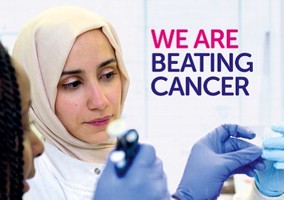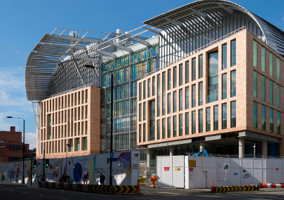Not many people are expecting 2019 to be an uneventful year, but Cancer Research UK’s new chief executive is expecting a particularly busy time.
As well as dealing with the uncertainty around Brexit and the practical implications of leaving the European Union, the charity is planning to relocate its head office by the end of the year.
Michelle Mitchell joined last November from the MS Society where she had been for five years, and like most people she has a personal connection with the cause of cancer.
“I saw my mother nurse two of her sisters who died of cancer,” she says. “I really witnessed the devastating impact that it can have on families.”
“I wanted to combine that personal experience with the opportunity of bringing my experience and leadership to one of the biggest issues facing us in the UK if not around the world and make a personal contribution to affecting that change,” she adds.
Before joining the MS Society, Mitchell was charity director at Age UK, and she was given an OBE in the 2016 New Year Honours for services to older people and the voluntary sector.
She’s anticipating the next year to be one of challenges and opportunities. “I think our key test is our ability to respond and be agile in the context of a changing external environment.”
‘A big theme for me is collaboration’
As CRUK looks to develop its next strategic plan, Mitchell says that collaboration will be at the heart of all its relationships.
This includes working with the “best and the brightest minds in the world” on research, corporate partners and the charity’s staff and volunteers.
It also means working with small and large charities - “sharing our skills and experience and learning from them”.
Some of the debates about the state of the sector have unintentionally pitted small charities against larger charities. But Mitchell describes the sector as a “very broad tapestry of organisations and movements”, and believes there is space for everyone.
She’s less concerned about the size or legal structure of a potential partner and more focused on the impact people are trying to make. She says she's seeking to form partnerships around a shared aim, “whether that’s across private, public, charitable all small medium and large”.
Having a “clear purpose” makes it easier to get things done, and to “collaborate and use the skills, expertise, resources of all of those involved in that collective endeavour,” she says.
“Although CRUK are of course a large charity, we’re small compared to the scale of the challenge,” she adds.
“We want to work with all those who share our mission and our values to accelerate our progress against that big social impact goal which is surviving cancer, so we’re very open minded about how we do that.”
She wants the charity to be a “open to innovation and open to new ideas”, because that “empowers and supports our staff and our volunteers and supporters to engage with us and give their best to us”.
Investment in fundraising
“We also have great opportunities through the ability of data, tech, digital to enable us to have personalised relationships,” she says.
She hopes to be able to “mobilise and engage people on a scale that was previously prohibitively expensive, and to grow those people in the cancer community to support our work and contribute to our mission”.
But the uncertainty created by Brexit and fears of an economic downturn mean she’s cautious of setting overly ambitious targets.
“I would hope that we will continue to grow during the next five years, both our fundraising income and also our trading income in our investment income, because we have a broad income generation portfolio,” she says.
But she adds: “It’s important to temper that though by being realistic about the challenge in a more uncertain economic environment.”
CRUK is the largest fundraising charity, according to research recently published by Fundraising Magazine, raising over £440m from voluntary sources.
Mitchell says the charity will “continue to significantly invest in a number of areas, one of which is legacy giving, which remains terribly important for us” - in 2017 £186.6m came from legacies.
She’s also looking to “revamp and modernise” its flagship mass participation event, Race for Life. The event is the largest mass participation event in the UK but income from it has fallen in recent years. It raised £32m last year compared to over £50m in 2015.
CRUK is also looking to expand its charity shops and to develop its philanthropic giving model, following the success of raising £100m to build the Crick Institute.
Brexit brings a range uncertainty
Leaving the European Union is likely to affect both CRUK’s income and how it is able to operate. “So Brexit is high up on our agenda,” Mitchell says.
“For us, Brexit brings us a lot of uncertainty, and that’s uncertainty across a whole range of areas,” she says.
She’s concerned about the “impact it will have on clinical trials, and the role of the of the UK as one of the best places to conduct clinical trials”, as it may be harder for researchers to come to the UK. “There’s a big debate which we’re watching,” she says.
But there are also implications for fundraising if there’s an economic shock, particularly for legacies and individual giving.
“We have begun to assess those risks, but what we don’t know is what’s going to happen yet. So we’re working on a number of different scenarios at the moment. What we do know is we will have to be pretty agile and adapt to the changes as they begin to be implemented,” she says.
New headquarters
CRUK is one of a number of charities moving their headquarters from central London to Stratford, and expects the move to take place towards the end of this year.
Mitchell has already “put on my helmet and my working boots” to visit the new site. “There’s a lot of excitement and a lot of charities are moving there so I think it’ll be the place to be,” she says
There are two main benefits to the move: reducing costs and creating a modern working environment.
“We’ve worked over the last few weeks, and before I joined, with our staff about what the future of work looks like for us, and how we can ensure and create a space that supports collaboration and that enables to work effectively across function, across departments and across organisations,” she says.
Being more agile
Alongside moving offices, there is “an exciting programme of change looking at how we can upgrade our technical and digital capability to ensure agile working”.
“I think we have a history and culture of being agile,” she says, but part of the change programme is about helping people to “think much more about a test and learn approach”.
“That’s bearing quite significant fruit,” she says. “We’ve got quite a long way to go but investing early and beginning to shift and change the mind-set and culture internally has been an important part of our growth and development over recent years.”
Mitchell views being agile as the key way the charity will navigate uncertainty that lies ahead.
She says we are entering “a different period than the one that’s come before, but one which has challenges and opportunities, and I think our key test is our ability to respond and be agile in the context of a changing external environment.”
|
Related articles












